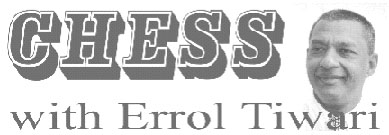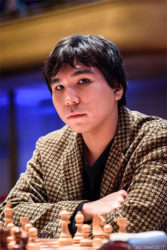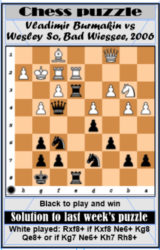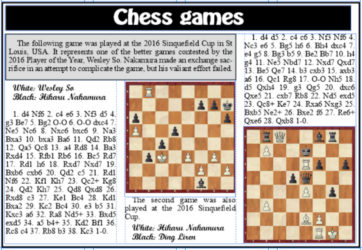“Chess is like business. I mean it is very important, because it is strategic thinking. You are calculating all your moves. You know what is very likely (to occur).” – Russian billionaire businessman Andrey Guryev, during an interview with A J Steigman, headlined “The Business of Chess” and published in the Huffington Post, November 22, 2016.
The previous chess column featured two enhancing diagrams and stimulated a sprinkling of favourable comments from both the erudite cognoscenti and the amateur man-in-the-street. The statistics of those who demonstrated an interest is minimal when juxtaposed with other popular sports, because chess is a dwindling competitive pastime locally;  therefore, the calls received in recognition of the content of the column, was heartwarming. It means that although the structure of the game is rocking indifferently on a shaky foundation, there is hope the base can be righted, and we can move emphatically along our way.
therefore, the calls received in recognition of the content of the column, was heartwarming. It means that although the structure of the game is rocking indifferently on a shaky foundation, there is hope the base can be righted, and we can move emphatically along our way.
Chess enjoyed its heyday in the 1970s, into the 80s. Guyana became recognized in chess when the nation placed first within the English-speaking Caribbean at the 1975 Caribbean Chess Championship, primarily through the distinctive efforts of the venerable Maurice Broomes, a school teacher by profession. Broomes was acknowledged within the Caribbean and South America, although he represented Guyana in other countries. At the influential Chess Olympiads in Argentina and Malta, Broomes was comfortably assisted by his brother Gordon, Edan Warsali, Edward Greenman, Ronald Austin and John Macedo. Some of the ablest players of the time also included Joseph Chang-Soong, Michael Chan, Michael Marques and Deryck Daniels. Most of these players subsequently emigrated, and, as far as I am aware, they continued to play chess, though not competitively. Chan, a medical doctor, appeared out of the blue when he learnt I was participating in a chess tournament at Queen’s University in Canada.

The problem with chess, from earlier times up to the present, is that it never became popular. Chess had always been closeted for a few. Not necessarily for the privileged, but for all and sundry whoever takes the time to learn and play the game. Altogether, the brainy pastime was much more popular previously, than it is today.
Consider the arithmetic of an average of 100 persons, sometimes less or more, turning up for a tournament in the 70s and 80s, to an average of 12 to 16 in 2016. How can we address this glaring inconsistency of then and now in an adverse chess situation?
Somehow or the other, from the annals of speechmaking, the words of Winston Churchill come immediately to mind, when he asked a tantalizing question during one of his famous war speeches: “What is our aim?” And responded, “Victory!” In like manner, our aim, I suppose, would be to promote chess to be played in a structured fashion in at least some of our schools. If football, cricket and table tennis are being organized and played within the school system, then I suppose chess can be given some attention also. Chess is a sensitive commodity since it is not as popular as the three disciplines mentioned. Therefore, for a beginning, a new beginning to popularize the game, the principals of the Guyana Chess Federation can consider re-introducing the studious Schools Chess Championships, which will sensitize our students toward the game, and encourage them to actually play it. Simultaneously, we will unconsciously, and gradually, have chess ingrained into our culture. Playing chess in our school system will also bring another advantage to our students. It is felt that when students play chess, they tend to become somewhat disinterested in drugs. That is the reason why, in some countries, chess is becoming mandatory within the school system.

 There is absolutely nothing pernicious, or destructive, about playing chess. There is everything to gain. Are we concerned we will manufacture a population of more insightful people, with a few geniuses in between? It is believed genius child prodigies appear only in mathematics, music and chess. Certainly, we have no prodigies in mathematics and music. However, there is hope, and for the optimists, a sincere belief, that we can find one in chess. How great would that be?
There is absolutely nothing pernicious, or destructive, about playing chess. There is everything to gain. Are we concerned we will manufacture a population of more insightful people, with a few geniuses in between? It is believed genius child prodigies appear only in mathematics, music and chess. Certainly, we have no prodigies in mathematics and music. However, there is hope, and for the optimists, a sincere belief, that we can find one in chess. How great would that be?
Internationally, the Tata Steel Tournament is winding down in the Netherlands. It ends today. As at Friday, the 2016 Player of the Year, Wesley So of the US, had a comfortable one point lead on World Champion Magnus Carlsen, with three games remaining to be contested. So defeated Poland’s Radoslaw Wojtazek to go one point ahead in the competition, but Carlsen could not crack the Indian grandmaster Pentala Harikrishna and therefore ended with a draw. Armenia’s Levon Aronian was in the next spot, on six points ahead of four super-grandmasters. Carlsen was set to oppose India’s Baskaran Adhiban and to play his challenger for the World Championship Title Sergey Karjakin on Sunday, during the final game of the competition. The top six contenders of the competition are as follows:
- Wesley So
- Levon Aronian
- Magnus Carlsen
- Sergey Karjakin
- Pavel Eljanov
- Wei Yi





